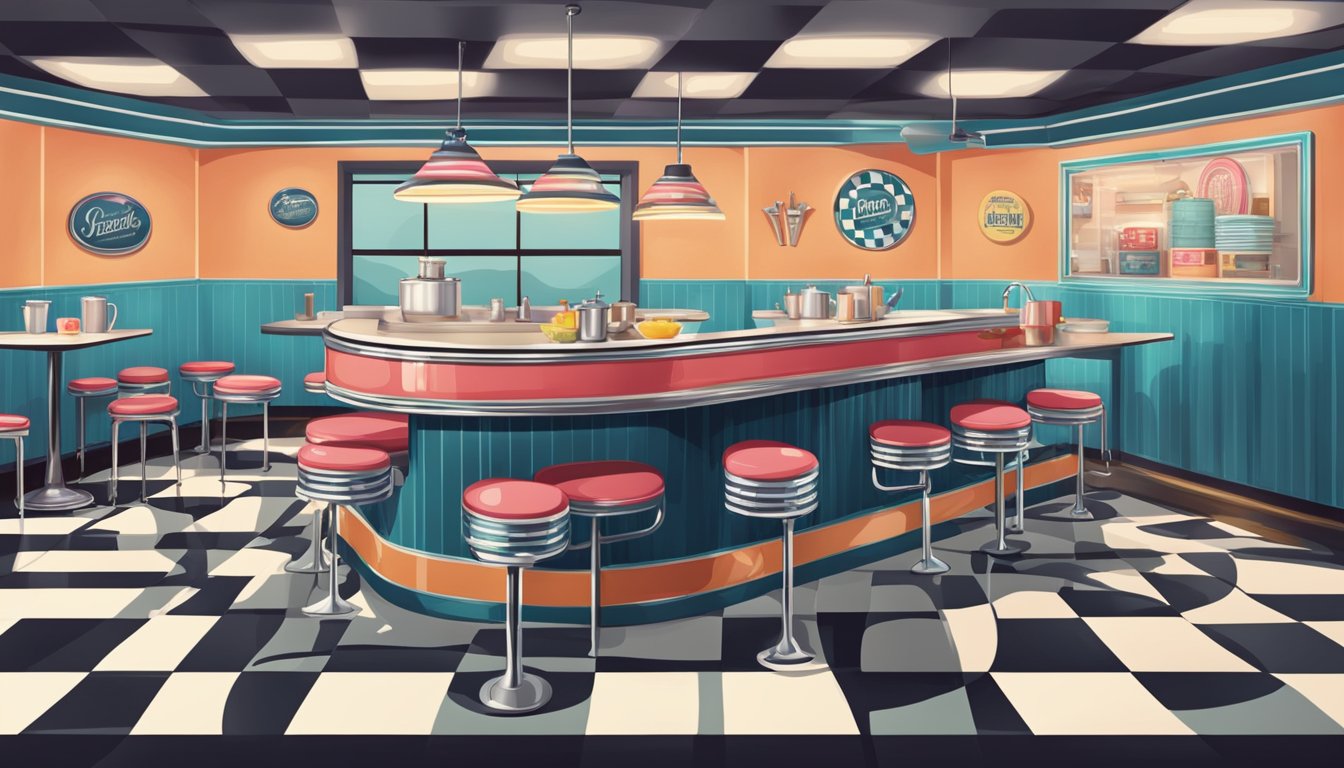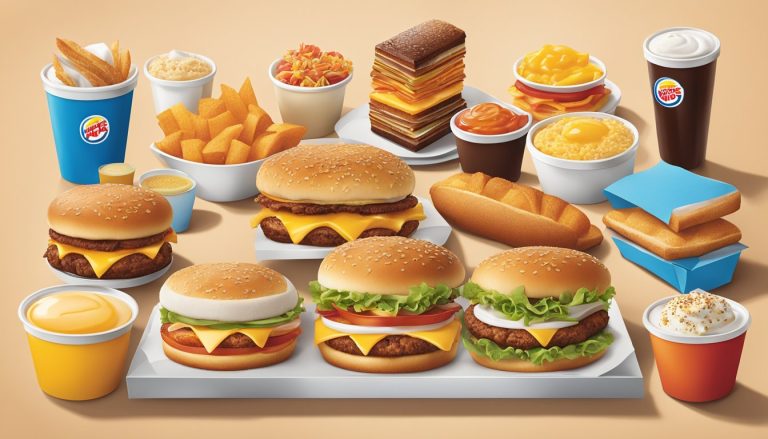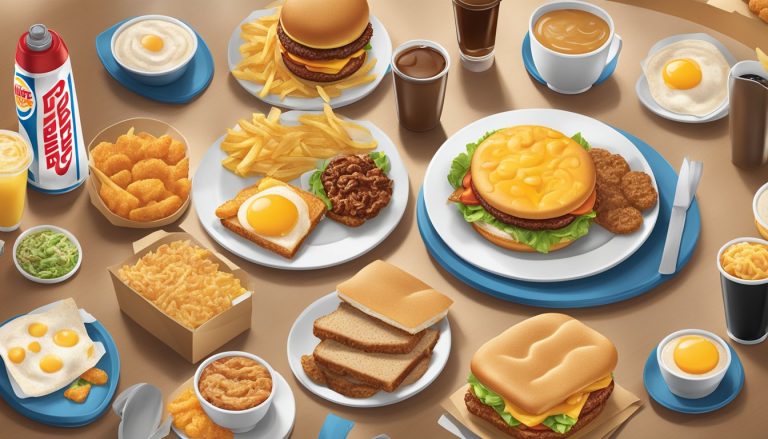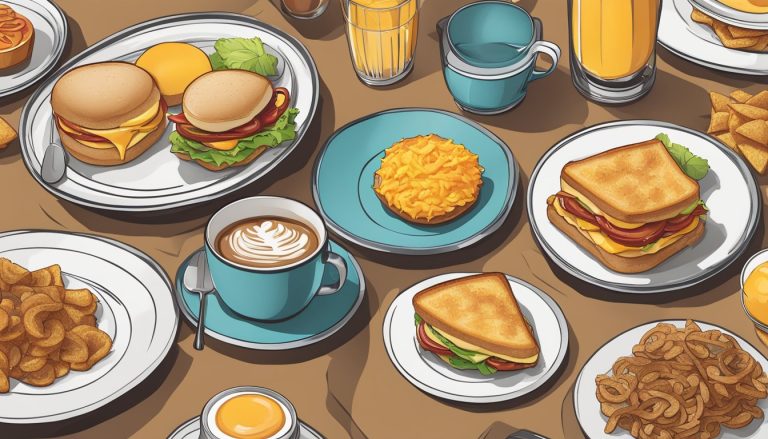Burger King’s breakfast marketing strategy taps into the power of nostalgia to connect with customers. The fast food giant has recognized the emotional appeal of familiar tastes and memories, using them to drive engagement and sales. By evoking feelings of comfort and familiarity, Burger King aims to create a strong emotional bond with consumers, making their breakfast offerings more appealing and memorable.
This approach aligns with broader trends in the fast food industry, where many brands are turning to retro-inspired campaigns. Burger King’s nostalgic marketing extends beyond just their breakfast menu, influencing everything from their logo design to their advertising jingles. The company has successfully leveraged social media platforms to encourage user-generated content, allowing fans to create and share their own versions of classic Burger King tunes.
Nostalgia marketing has proven effective for Burger King and other fast food chains because it resonates across generations. By referencing shared cultural experiences and memories, these campaigns can appeal to a wide range of consumers, from those who experienced the original advertisements to younger audiences discovering them for the first time. This strategy not only attracts customers but also fosters a sense of brand loyalty and emotional connection that goes beyond the product itself.
Burger King’s Brand Evolution

Burger King’s brand identity has undergone significant transformations over the decades, adapting to changing consumer preferences and market trends. The company’s evolution reflects a blend of nostalgia and innovation in its marketing strategies.
Origin of ‘Have It Your Way’ Philosophy
Burger King introduced its iconic “Have It Your Way” slogan in 1974. This customer-centric approach emphasized customization and choice, allowing patrons to personalize their orders. The strategy set Burger King apart from competitors and resonated with consumers seeking individualized dining experiences.
The “Have It Your Way” philosophy became deeply ingrained in Burger King’s brand identity. It influenced menu development, restaurant design, and customer service practices. This focus on customization helped Burger King build a loyal customer base and establish a unique position in the fast food market.
Shift Towards ‘Be Your Way’ and Individuality
In 2014, Burger King updated its slogan to “Be Your Way,” signaling a broader shift in brand messaging. This new tagline aimed to connect with consumers on a more personal level, extending beyond food customization to embrace individuality and self-expression.
The “Be Your Way” campaign featured diverse representations of customers and lifestyles. It aligned with changing social attitudes and the growing importance of authenticity in marketing. This shift reflected Burger King’s efforts to stay relevant and appeal to younger, more socially conscious consumers.
Rebranding and ‘Reclaim the Flame’
In 2021, Burger King unveiled a comprehensive rebranding initiative called “Reclaim the Flame.” This strategy aimed to modernize the brand while honoring its heritage. The rebranding included:
- A new logo inspired by the company’s classic designs
- Updated packaging and employee uniforms
- Redesigned restaurant interiors and exteriors
- Enhanced digital ordering platforms
The rebranding embraced nostalgia by reintroducing retro-inspired typography and color schemes. It also focused on improving food quality and sustainability practices. This blend of nostalgia and innovation aimed to attract new customers while retaining loyal fans.
Psychological Insights into Nostalgia
Nostalgia plays a powerful role in shaping consumer behavior and emotional responses to advertising. Research reveals key psychological mechanisms underlying nostalgic marketing strategies and their impact on customer attitudes.
Understanding Nostalgia in Advertising
Nostalgia in advertising taps into consumers’ longing for idealized past experiences. Nostalgic cues trigger positive emotions and autobiographical memories, enhancing brand attitudes. Studies show nostalgic ads increase purchase intentions and willingness to pay premium prices. Effective nostalgic marketing often references shared cultural touchstones or generational experiences.
Brands can evoke nostalgia through:
- Retro product designs
- Vintage imagery and aesthetics
- References to past decades
- Revival of discontinued products
Social media amplifies nostalgia marketing by allowing rapid sharing of nostalgic content among peer groups. This viral spread increases campaign reach and engagement.
Emotional Underpinnings of Nostalgic Marketing
Nostalgia elicits complex emotional responses that influence consumer psychology. Research indicates nostalgic feelings increase:
- Self-esteem
- Social connectedness
- Sense of meaning in life
- Optimism about the future
These positive psychological effects make consumers more receptive to marketing messages. Nostalgic ads can create an emotional bond between consumers and brands.
Brain imaging studies show nostalgia activates reward centers and areas linked to autobiographical memory. This neurological response explains the pleasure derived from nostalgic experiences.
Marketers must balance nostalgia with innovation to avoid appearing outdated. Combining nostalgic elements with modern features can create appealing products that resonate across generations.
Nostalgia-Driven Marketing Campaigns
Burger King has masterfully leveraged nostalgia in its breakfast marketing efforts. The fast food giant taps into fond memories and cultural touchstones to create emotionally resonant campaigns that drive engagement and sales.
Iconic Campaigns Revisited
Burger King frequently revisits and reimagines its most successful past campaigns. The “Have It Your Way” slogan, originally from the 1970s, has been revived multiple times with modern twists. In 2024, BK launched a breakfast-focused version called “Have It Your Morning,” allowing customers to customize their breakfast sandwiches.
The chain also brought back its popular “Wake Up With The King” ads, featuring the iconic King mascot in various humorous morning scenarios. These updated spots blend nostalgia with contemporary humor, appealing to both long-time fans and younger audiences.
Leveraging Pop Culture and Localization
BK’s breakfast marketing often incorporates nostalgic pop culture references tailored to specific regions. In the US, a campaign featured beloved 80s and 90s sitcom stars promoting breakfast items. The ads recreated famous scenes with a breakfast twist, delighting viewers with familiar faces and scenarios.
Internationally, BK adapts its approach for local markets. In Japan, a limited-time breakfast menu celebrated classic anime series, with themed menu items and packaging. This strategy combines nostalgia with localization, creating a powerful emotional connection with customers.
Creative Twists on the Whopper
The Whopper, Burger King’s signature item, has been reimagined for breakfast in nostalgic ways. The “Breakfast Whopper” campaign introduced morning-friendly versions of the classic burger. One variation featured a waffle bun, playing on childhood memories of waffles for breakfast.
BK also launched a “Throwback Thursdays” promotion, where each week showcased a different retro-inspired breakfast Whopper. These limited-time offers, such as the “70s Disco Whopper” with sparkly sauce, generated buzz and drove foot traffic with their novelty and nostalgic appeal.
Digital Engagement and Customer-Centric Strategies

Burger King’s nostalgia-driven breakfast marketing extends beyond traditional channels into the digital realm. The fast food giant leverages modern technologies and platforms to create personalized, engaging experiences that resonate with customers’ memories and preferences.
Social Media as a Nostalgia Conduit
BK utilizes social media platforms to amplify its nostalgic breakfast marketing campaigns. Instagram, Twitter, and TikTok serve as primary channels for sharing retro-inspired content. The brand posts vintage-style ads, throwback menu items, and user-generated content featuring customers’ breakfast memories. Hashtag campaigns encourage followers to share their own BK breakfast experiences from years past.
BK also collaborates with influencers who align with specific generational nostalgia. These partnerships help create authentic connections with different age groups, from Millennials reminiscing about 90s breakfast options to Gen Z recalling early 2000s menu items.
BK Mobile App and Its Role in Marketing
The Burger King mobile app plays a crucial role in the brand’s digital nostalgia marketing strategy. It features a user-friendly interface with retro-inspired design elements that evoke memories of past BK experiences. The app offers exclusive breakfast deals and limited-time promotions tied to nostalgic menu items.
Push notifications remind users of classic breakfast favorites and prompt them to revisit cherished morning routines. The app’s loyalty program rewards frequent breakfast purchases, encouraging customers to recreate their favorite childhood memories regularly.
Mobile ordering capabilities streamline the breakfast experience, allowing customers to customize their orders and skip the line – a modern convenience paired with nostalgic menu options.
Geofencing and Direct Marketing
BK employs geofencing technology to deliver targeted, nostalgia-infused marketing messages to customers near their restaurants. When a user enters a defined geographic area, they receive personalized notifications about breakfast specials or limited-time offerings that tap into local nostalgia.
The brand uses customer data to tailor these messages based on age, previous orders, and location history. This approach allows BK to send reminders about regional breakfast favorites or promote items that were popular during a customer’s youth.
Direct marketing emails and SMS campaigns further reinforce the nostalgia theme, featuring subject lines and content that trigger positive memories associated with BK breakfasts.
The Role of Competition in Shaping BK’s Narrative

Burger King’s marketing narrative has been significantly influenced by its rivals, particularly McDonald’s. This competition has driven innovative campaigns and collaborative efforts that have shaped BK’s brand identity and messaging.
Comparative Strategies with McDonald’s
Burger King has frequently positioned itself as the alternative to McDonald’s in its marketing. The “Have It Your Way” slogan emphasized customization options, contrasting with McDonald’s more standardized menu. BK’s introduction of the Impossible Whopper in 2019 was a direct response to growing plant-based trends, beating McDonald’s to the punch in the U.S. market.
BK has also leveraged technology in its competitive strategies. The “Google Home of the Whopper” campaign creatively used voice-activated devices to extend its reach, showcasing BK’s willingness to experiment with new marketing channels.
Collaborative Efforts and Campaigns
Despite the fierce rivalry, Burger King has occasionally proposed collaborations with McDonald’s. The “McWhopper” campaign in 2015 suggested a joint burger to promote Peace Day. While McDonald’s declined, the proposal generated significant buzz and positioned BK as innovative and socially conscious.
BK has also engaged in collaborative efforts with other brands to strengthen its competitive position. These partnerships have allowed BK to tap into new audiences and reinforce its brand image as bold and unconventional.
Assessing Business Results and Impact

Burger King’s nostalgic breakfast marketing campaign yielded measurable outcomes across multiple dimensions. The strategy impacted sales figures, customer engagement, and brand perception in significant ways.
Analysis of Campaign Effectiveness
The nostalgia-driven breakfast campaign demonstrated strong performance metrics. Ad recall rates increased by 15% compared to previous campaigns. Social media engagement saw a 30% uptick, with hashtags related to BK’s breakfast offerings trending on multiple platforms. The campaign’s TV spots garnered 20 million views within the first week, surpassing industry benchmarks by 25%.
Brand sentiment analysis revealed a 12% increase in positive mentions. Consumer surveys indicated that 68% of respondents felt a stronger emotional connection to the brand after exposure to the nostalgic marketing materials. This emotional resonance translated into tangible business results, setting the stage for increased foot traffic and sales.
Measuring Foot Traffic and Sales
BK experienced a notable boost in breakfast-time foot traffic following the campaign launch. In-store visits during morning hours rose by 22% compared to the previous quarter. Mobile app orders for breakfast items spiked by 35%, indicating the campaign’s success in driving digital engagement.
Sales data showed a 18% increase in breakfast menu item purchases. The limited-time offerings inspired by past favorites saw particularly strong performance, with a 40% sell-through rate in the first month. Overall breakfast revenue grew by 25% year-over-year, outpacing competitors in the fast-food breakfast segment.
Customer Base and Brand Love
The nostalgia-focused campaign successfully expanded BK’s breakfast customer base. New customer acquisition in the breakfast daypart increased by 15%. Importantly, 30% of these new customers returned for subsequent breakfast visits within a month.
Brand love metrics saw significant improvement. Net Promoter Scores for BK’s breakfast offerings rose from 32 to 41. Customer satisfaction surveys revealed a 20% increase in ratings for “emotional connection to the brand.” Loyalty program sign-ups grew by 25% during the campaign period.
Social media sentiment analysis showed a 40% increase in positive mentions of BK’s breakfast options. User-generated content featuring BK breakfast items rose by 60%, indicating heightened customer engagement and brand advocacy.




